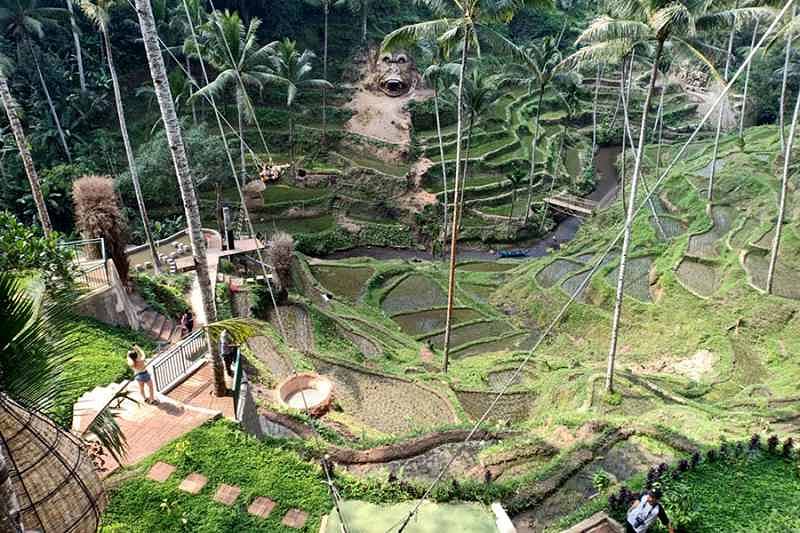The Ultimate Plan for Checking Out Agrotourism in Ubud: What to See and Do
The Ultimate Plan for Checking Out Agrotourism in Ubud: What to See and Do
Blog Article
Checking Out the Abundant Culture and Breathtaking Landscapes of Agrotourism in Ubud
Ubud, frequently commemorated as the heart of Bali, presents an one-of-a-kind possibility for those seeking to experience agrotourism that seamlessly blends social splendor with amazing landscapes. As tourists browse via Ubud's lively tapestry of traditions, they are invited to reveal the tales behind each cultural practice and landscape function.
Finding Ubud's Cultural Heritage
Nestled in the heart of Bali, Ubud serves as a vivid center for those anxious to dig into the island's rich cultural heritage. Understood for its artistic customs, Ubud is a hub where ancient practices fulfill modern-day expressions, creating a special tapestry of social experiences. Visitors are attracted to its myriad of workshops, holy places, and galleries, each supplying a look right into Bali's artistic and historic legacy.
Central to Ubud's social appeal is the Ubud Palace, a considerable landmark that stands as a testament to the area's imperial heritage. The palace frequently organizes typical dance efficiencies, offering a genuine insight into Balinese narration via dancing and music. Additionally, the streets of Ubud are lined with galleries showcasing works of both distinguished Balinese musicians and emerging talents, mirroring the island's dynamic art scene.

Immersive Agricultural Knowledge

In addition, Ubud's agrotourism campaigns typically include workshops on sustainable farming techniques. These workshops emphasize the significance of chemical-free farming, permaculture, and biodiversity conservation, often under the support of experienced experts. They act as an instructional system for travelers, cultivating a deeper gratitude for the details of sustainable agriculture.
In addition, site visitors can discover coffee and cacao ranches, where they find out about the processes of cultivation and production. Led tours use thorough explanations of each step, from bean to cup or cocoa vessel to chocolate bar, enhancing the overall understanding of these significant farming products.
These immersive experiences not just improve site visitors' understanding of Ubud's agricultural heritage however likewise promote lasting tourism techniques, guaranteeing the preservation of these cultural landscapes for future generations.
Beautiful Rice Terraces and Landscapes
Building on the immersive agricultural experiences, visitors are drawn to the fascinating beautiful rice terraces and landscapes that specify Ubud's countryside. The legendary Tegalalang Rice Terraces are especially prominent, using an elegant display screen of Balinese resourcefulness in farming. These balconies are not just practical yet additionally act as a testimony to the unified relationship between the Balinese people and their atmosphere. The subak watering system, a UNESCO-recognized cultural heritage, showcases a ancient and sustainable you could try here method of water management that proceeds to sustain local agriculture.
As visitors go across the winding courses through the terraces, they are met with scenic sights that extend throughout green areas, stressed by guiding coconut palms and the far-off silhouette of Mount Agung. The landscape supplies a serene background that welcomes consideration and recognition of nature's elegance (Agrotourism in Ubud). For those interested in digital photography, the ever-changing light and shadows cast by the daybreak or sunset provide plenty of opportunities for capturing sensational images
Beyond the terraces, Ubud's moving hills and lavish greenery create a varied tapestry that bids exploration. Treking trails meander through these landscapes, allowing site visitors to get in touch with the land and experience the peaceful rhythm of country life.
Farm-to-Table Culinary Delights
Among the natural beauty of Ubud's landscapes, the farm-to-table activity provides an authentic culinary experience that attaches site visitors with the area's agricultural heritage. This approach commemorates the symbiotic connection between the land and its fruit and vegetables, with local ranches supplying fresh, organic active ingredients to Ubud's innovative chefs. Site visitors are invited to participate in a gastronomic journey where the beginnings of each active ingredient are transparently showcased.
In Ubud, farm-to-table dining transcends plain intake; it becomes an educational experience. Restaurants typically supply led scenic tours of the farms providing their kitchen areas, allowing diners to witness lasting farming methods firsthand. This link cultivates a much deeper admiration for the thorough care that enters into growing the plants and increasing livestock.
The culinary offerings reflect the rich diversity of Ubud's agricultural landscape, featuring meals that highlight seasonal fruit and vegetables and traditional Balinese flavors. From dynamic salads teeming with unique environment-friendlies to fragrant curries instilled with fresh natural herbs, each plate is a testament to the region's abundant harvests.
Furthermore, the farm-to-table principles supports neighborhood browse around these guys farmers and neighborhoods, ensuring that farming customs are preserved while advertising economic sustainability. This movement emphasizes a commitment to high quality, sustainability, and the celebration of Ubud's one-of-a-kind terroir.
Involving With Local Craftsmens
Many visitors locate themselves captivated by the intricate workmanship of Ubud's neighborhood artisans, whose work shows the area's rich cultural heritage. These craftsmens, typically masters of their craft, contribute significantly to Ubud's vivid social landscape. From typical batik fabrics to meticulously sculpted wood artifacts, each piece informs a story interwoven with generations of experience and custom.
Involving with these artisans provides a special possibility to dive deeper right into Balinese culture. Several workshops use hands-on experiences, where vacationers can find out methods given via centuries. These interactive sessions not only foster gratitude for the craftsmens' skills but also supply a significant connection to the region's history and customs.
Visitors can check out artisan towns such as Mas, renowned for its great timber carvings, or Celuk, renowned for charming silver jewelry. Right here, one can witness the dedication and precision called for to create each work of art. Acquiring directly from these artisans ensures that the earnings sustain regional areas and find more info maintain conventional practices.
In Ubud, engaging with local craftsmens is not just a traveler activity; it is an enhancing cultural exchange that boosts the agrotourism experience, leaving visitors with a deeper understanding and gratitude of Bali's creative heritage. - Agrotourism in Ubud
Final Thought
The expedition of Ubud's agrotourism supplies an extensive admiration for Balinese cultural heritage and all-natural elegance. Jointly, these aspects promote a deeper understanding and admiration of Ubud's enduring natural and social appeal.
Central to Ubud's cultural appeal is the Ubud Palace, a substantial spots that stands as a testament to the region's royal heritage.Ubud offers a myriad of immersive agricultural experiences that permit visitors to engage deeply with the island's agricultural lifestyle.Building on the immersive agricultural experiences, visitors are attracted to the exciting breathtaking rice balconies and landscapes that specify Ubud's countryside.Amidst the natural charm of Ubud's landscapes, the farm-to-table activity uses an authentic culinary experience that connects visitors with the area's farming heritage.Several visitors discover themselves captivated by the detailed craftsmanship of Ubud's regional craftsmens, whose work reflects the region's abundant cultural heritage.
Report this page